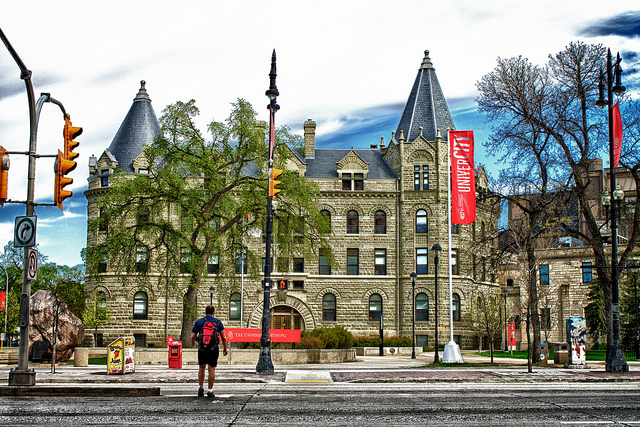Like this article? rabble is reader-supported journalism. Chip in to keep stories like these coming.
Lazy, entitled, apathetic, disengaged: these are just some of the words that are used to mis-categorize and label post-secondary students. The reality of the average Manitoban student is stringing together a series of part-time jobs, incuring large amounts of student debt to pay for tuition and figuring out how to make their food budget stretch until another pay day.
This is the daily struggle for a lot of students. But we are told to stop complaining, and be happy, and “did you know back in my day…” However, back in the day a generation ago, post-secondary education (PSE) was funded well over 80 per cent and tuition fees were easily earned through summer employment. In fact, the Canadian Centre for Policy Alternatives released The Tuition Project Tool that highlights the number of hours needed to work to cover tuition today as compared to 1975. In Manitoba, the average student needs to work at least twice the amount of hours than their counterpart in 1975. This is further complicated by the lack of available good jobs for youth over the summer break and for recent graduates. An effective policy to address accessibility and affordability is the conversion of loans to grants.
The Canadian Federation of Students – Manitoba has been fighting for affordable, accessible and high quality public post-secondary education (PSE) on behalf of students for decades. Student activists have been leading the fight against systemic inequalities that are fostered by most university administrations and inaction from political parties. The research indicates that high school students from lower socio-economic backgrounds cite debt aversion as the top deterrent for pursuing PSE. At the same time, over 75 per cent of new job postings require post-secondary credentials. Therefore we are setting up our most marginalized young citizens to fail.
Students currently leaving university with an undergraduate degree will have an average $19,000 in debt. The effects of skyrocketing debt are being felt during and after post-secondary as evidenced in the recent increase in food bank usage on and off campus. Additionally, research has illustrated time and time again that students who take on student debt are delayed in pursuing major life purchases and decisions such as buying a house or car, starting a business, having children, getting married and saving for retirement. Coupled with an unpredictable and a precarious job market, our students are in a persistent position of disadvantage compared to generations past.
The conversion from loans to grants would effectively reduce student debt and increase access to education. It has been said that a grants program is not possible and would cost too much money. However, the total cost of loans distributed to both students pursuing public and private post-secondary was $31.5 million — barely 4 per cent of total Manitoba expenditures. Therefore, financially it is well within the realm of possibility for Manitoba. It is important to point out that the conversion of loans to upfront grants was implemented in Newfoundland and Labrador under a then Progressive Conservative government. Newfoundland and Labrador funded post-secondary education as a proactive measure to mitigate the negative effects of a poor provincial economic situation for youth, effectively reversing the trend of youth out-migration from the province and boosting the province’s economy.
In order for Manitoba to take the next step toward truly affordable and accessible education for all, it is time to convert upfront loans into needs-based grants. Political parties are starting to listen, with both the NDP and Liberal 2016 provincial election platforms. The NDP platform promises a $40 million investment into a full conversion of Manitoba student loans to grants starting in 2016-2017 academic year for all students. The Liberal platform also promises an investment of $10 million to convert loans to grants however the grants will only be available to new students in the 2016-2017 academic year and does not become a grant unless the student maintains passing grades and graduates. While this is a step in the right direction, the Liberal policy excludes current students and places an asterisk on access.
The Progressive Conservative Party released their post-secondary platform and unlike the other major parties in Manitoba, they will only invest a total of $2.25 million dollars into the Manitoba Scholarship and Bursary Initiative (MSBI). The MSBI was created in 1997-1998 to encourage private donations for bursaries and scholarships by matching funds at a rate of 50/50 share. The funds are distributed along two main criteria “financially needy students” and “academic merit” and divvied up according to an enrollment formula. The Progressive Conservatives also promised to change the cost share model to one-third government and two-thirds private funding, hypothetically allowing the fund to increase to $20 million. This fund is insignificant and does little to address growing student debt. The policy platform ignores the real challenge of affordability, and does not offer a comprehensive solution to ensuring debt relief for students and their families. It is more in line with maintaining the status quo and does nothing to substantially improve accessibility.
If government wants a system that educates, develops and uplifts students on the basis of their capacity and desire to learn and not on what is in their wallet, shifting from loans to grants is an important step in the right direction.
We call on the general public and all political parties to support a grants system in Manitoba, prioritizing the accessibility and quality of PSE. An investment in Manitoban students is an investment in Manitoba’s future.
Brianne Goertzen is the Manitoba Organizer and Michael Barkman is the Chairperson of the Canadian Federation of Students Manitoba.
Photo: AJ Batac/flickr
Like this article? rabble is reader-supported journalism. Chip in to keep stories like these coming.




